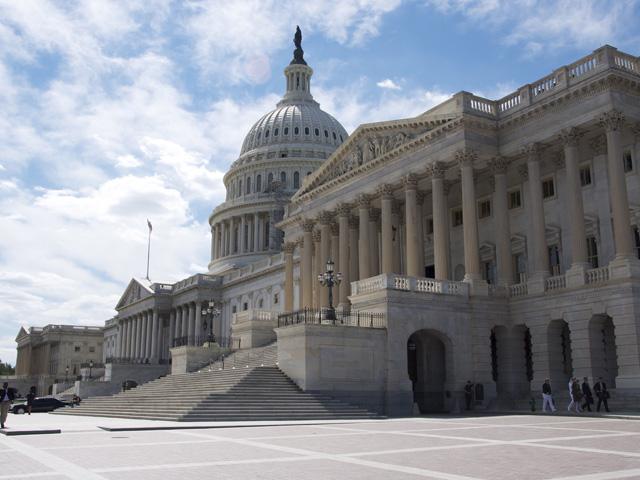DTN Ag Policy Blog
Senate Vote Advances Debate on Climate, Healthcare, Tax Bill
The U.S. Senate on Saturday evening voted 51-50 down party lines to advance the Inflation Reduction Act, the Democrat's budget reconciliation bill dealing with climate change, health care and tax increases on business to fund the programs.
The bill has provisions tied to climate-smart agriculture and renewable energy that would inject more funds into both of those areas.
The $739 billion bill focuses on spurring renewable energy and reducing emissions, but also allows Medicare to negotiate drug rates and it increases eligibility for the Affordable Care Act. To fund these measures, Democrats set a $15% minimum tax on large corporations and new tax on stock buybacks.
Democrats in the Senate advanced the bill using a budget reconciliation rule that allows the bill to pass on a simple majority with Vice President Kamala Harris voting to break the tie. The process is allowed on bills involving revenue and spending. Saturday evening's vote kicked off 20 hours of debate and votes on amendments.
If a final vote occurs Sunday, the bill will move to the House, where reports out of Washington indicate the House could vote on the bill Friday.
The climate provisions in the bill are meant to lower U.S. greenhouse emissions by 40% below 2005 levels by 2030. President Biden has set a goal to cut U.S. emissions by more than 50% by 2030.
CLIMATE SMART AG
The bill carves out $20 billion to support climate-smart agricultural practices for farmers. The funds would go to encourage farmers to adopt practices that reduce greenhouse emissions, reduce nitrogen loss or sequester carbon in the soil. The funds could also help with drought resilience in western states as well.
The funds would jump start USDA's current Climate Smart Commodities pilot program.
The funding breakdown includes:
$8.45 billion for the Environmental Quality Incentives Program (EQIP)
$6.75 billion for the Regional Conservation Partnership Program (RCPP)
$3.25 billion for the Conservation Stewardship Program (CSP)
P[L1] D[0x0] M[300x250] OOP[F] ADUNIT[] T[]
$1.4 billion for the Agricultural Conservation Easement Program (ACEP)
Another $1 billion would go to boost USDA conservation technical assistance as well.
USDA's Natural Resources Conservation Service would receive $300 million to quantify carbon sequestration and emissions on farmland.
RENEWABLE ENERGY PROGRAMS
The bill includes $9.7 billion in grants and loans to rural electric cooperatives to buy renewable energy, renewable energy systems, carbon capture and storage systems, and make energy efficiency improvements on generation and transmission systems. Those provisions have the support of the National Rural Electric Cooperative Association (NRECA).
The Rural Energy for America Program would get a $1.72 billion to promote energy efficiency and renewable energy for farmers and other rural small businesses.
Another $1 billion would go for "Section 317" loans for electric generation from renewable energy resources for rural and nonrural power companies. This includes solar, wind, hydropower, biomass, or geothermal. The federal government would cover up to 50% of the loans for such projects.
Biofuels would see another $500 million to develop blender pumps and other infrastructure to increase the blends of biofuels above 10% blend levels for ethanol and 20% for biodiesel blends.
The bill also extends the $1 per gallon biodiesel tax credit to 2024 and retroactively restarting it at the beginning of 2022.
Several farm and renewable energy groups signed on to a letter backing the biofuel provisions, including the American Soybean Association, National Corn Growers Association, National Farmers Union, National Sorghum Producers, Growth Energy, the Renewable Fuels Association, the Advanced Biofuels Business Council, Clean Fuels Alliance America and Fuels America.
Programs to develop sustainable aviation fuels would receive $591 million as well. The bill includes up to $1.75 a gallon tax credit for sustainable aviation fuels through the end of 2024.
Other tax incentives would expand wind, solar and other renewable energy through 10 years of tax credits.
Over $10 billion in loans and grants would become available through the Department of Energy to spur the manufacturing and technology for vehicles with low- or zero-exhaust emissions, as well has electric and hybrid vehicles.
Another $10 billion in tax credits would go to incentivize manufacturing facilities for electric vehicles, wind turbines or solar panels.
CARBON SEQUESTRATION
The 45Q tax credit for industrial carbon sequestration would be extended to projects that begin construction before 2033. The tax credit for injection or utilization is increased to $60 a ton. Direct air capture would go to $180 a ton, and disposal of carbon would go to $85 a ton.
The tax credits would likely spur more focus on carbon pipelines and sinking carbon into the ground where possible. The tax credits increase the incentives for large chemical and cement plans to look at ways to capture emission.
Also see, "Ag and Inflation Reduction Act" https://www.dtnpf.com/…
Chris Clayton can be reached at Chris.Clayton@dtn.com
Follow him on Twitter @ChrisClaytonDTN
(c) Copyright 2022 DTN, LLC. All rights reserved.



